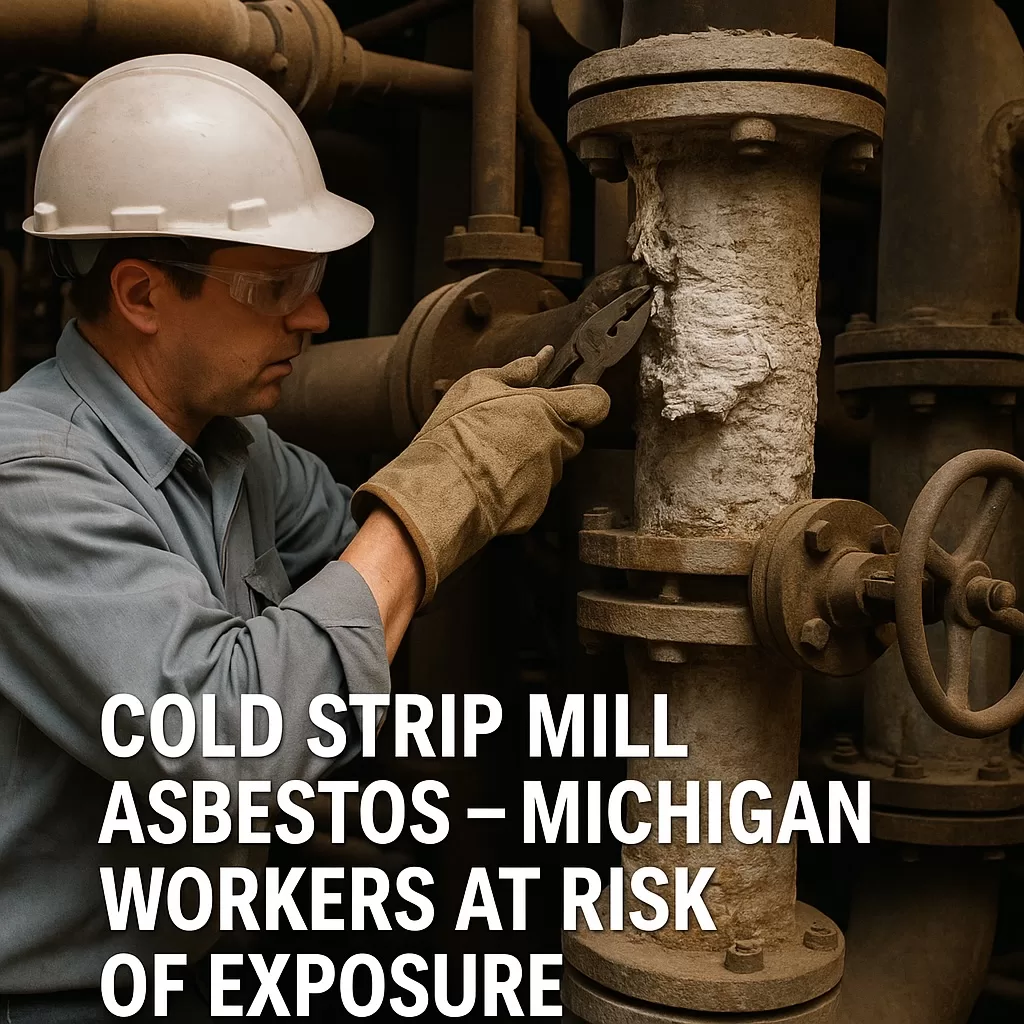Workers in cold strip mills across Michigan were regularly exposed to asbestos in insulation, electrical panels, and furnace systems. The cold strip mill asbestos risks were especially high in facilities like Great Lakes Steel in Ecorse and Rouge Steel in Dearborn. Today, many workers from those sites are being diagnosed with mesothelioma, lung cancer, and other asbestos-related diseases.
The cold strip mills of Michigan’s steel industry were vital to the production of sheet steel used in cars, appliances, and construction. But for many workers, time spent inside those mills also meant prolonged and unprotected asbestos exposure — particularly in older plants along the Downriver corridor.
How Cold Strip Mill Workers Were Exposed to Asbestos
Cold strip mills produced thinner steel sheets by reheating and rolling hot-rolled coil through a series of powerful reducing stands and annealing furnaces. These facilities often contained:
- Steam lines and heated oil systems insulated with asbestos
- Annealing and pickle lines with asbestos brake pads and insulation
- Reheat and soak furnaces lined with asbestos refractory brick
- Motor control cabinets and switchgear with asbestos arc shields
- Asbestos gloves, blankets, and shields used during maintenance
Exposure risks were highest for millwrights, electricians, maintenance mechanics, pipefitters, oilers, and cleaners who had direct contact with degraded insulation and worn-down equipment.
Michigan Cold Strip Mill Sites With Known Asbestos Risk
Some of the most notable asbestos-containing cold strip facilities in Michigan included:
- Great Lakes Steel – Ecorse/River Rouge (U.S. Steel)
- Rouge Steel (Ford) – Dearborn
- McLouth Steel – Trenton (former cold rolling operations)
👉 Search Asbestos Job Sites in Michigan
Even those who worked indirectly in production — or who came home carrying fibers on work clothing — may now be facing serious diagnoses.
Legal Help for Michigan Cold Strip Mill Workers
If you or a loved one worked in a cold strip mill and were diagnosed with mesothelioma, lung cancer, or asbestosis, you may qualify for:
- Lawsuits against former product manufacturers
- Asbestos trust fund claims
- Wrongful death claims (if a loved one has passed)
Why File Now?
Michigan has a strict statute of limitations for asbestos claims — typically just three years from diagnosis or death. Delays can result in lost benefits or missed trust fund deadlines.
We can help you file claims discreetly and efficiently, with no upfront fees. You may still have options even if your former employer is out of business.
Talk to a Michigan Asbestos Lawyer with Real Industry Experience
Attorney Lee W. Davis handled over 3,200 asbestos cases involving Saginaw Foundry, GM, and Downriver steel plants between 1996 and 1999. With deep knowledge of the trades, jobsites, and medical implications, he helps workers and families across Michigan pursue rightful compensation.
📞 Call (412) 781-0525 or use the form below to get started today.
Check If Your Family Was Exposed
Get your free guide instantly + a confidential case review.
🔒 100% Confidential. No obligations.
✅ FAQ – Cold Strip Mill Asbestos
What is a cold strip mill?
A cold strip mill processes hot-rolled steel into thinner, more precise sheets using heat, pressure, and annealing. Asbestos was used extensively in its systems.
What types of asbestos were found in cold mills?
Common products included pipe insulation, furnace refractory, brake pads, gloves, cement, and electrical panel materials.

